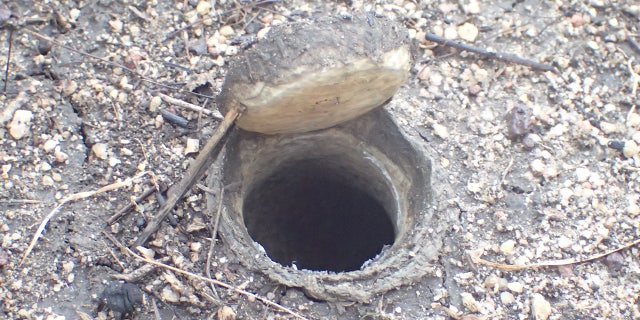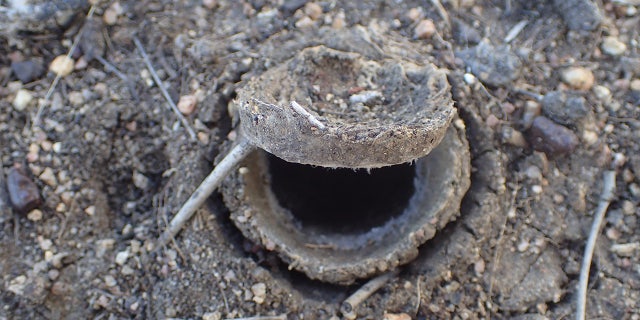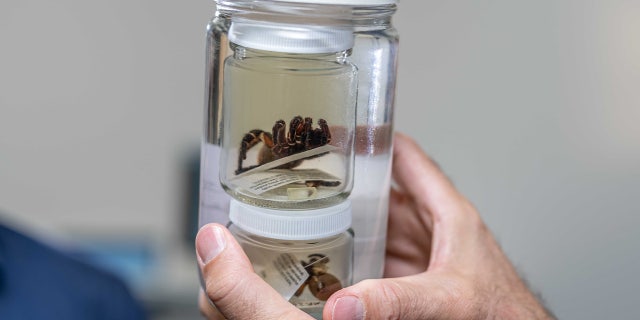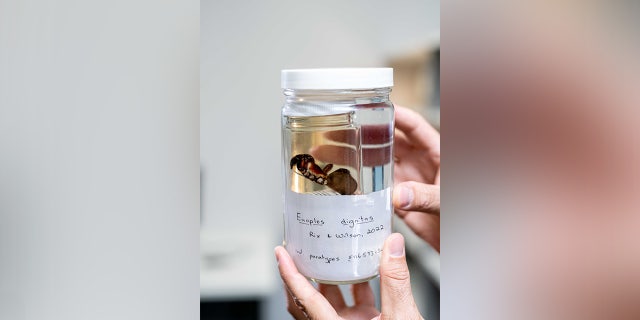New ‘giant’ spider found in Australia
The arachnid has been named Euoplos dignitas to reflect “the impressive size and nature of the spider,” scientists with the Queensland Museum said. (Queensland Museum)
A rare and giant species of trapdoor spider was found in Queensland, Australia, with scientists saying that the arachnid is considered an endangered species.
The tarantula has been named Euoplos dignitas and is only found in the Brigalow Belt in Central Queensland, Australia.
Euoplos dignitas is a large trapdoor spider that lives in open woodland habitats and builds its burrows in the black soils of the Central Queensland region in Australia. (Queensland Museum)
Its name is, “derived from the Latin “dignitas,” meaning “dignity” or “greatness” which reflects, “the impressive size and nature of the spider,” scientists with the Queensland Museum said in a press release.
“The name Euoplos dignitas is derived from the Latin dignitas meaning dignity or greatness and is reflected by the impressive size and nature of the spider and also a connection to Project DIG, who funded our research,” Lead author, Queensland Museum’s Principal Scientist and Curator of Arachnology Dr Michael Rix said in a statement to Fox News Digital.
WATCH: DAD FIGHTS OFF AGGRESSIVE MONKEYS IN THAILAND AFTER THEY LUNGE AT FAMILY
According to the Queensland Museum, the trapdoor spider was found by researchers who have been studying the Brigalow Belt in Central Queensland for the last four years.
The scientists worked as a part of Project DIG, a partnership with BHP and BMA, “that is transforming how the museum stores, explores and shares its collections and research.”

While the Queensland Museum did not share how big their find is, trapdoor spiders are typically up to 1.5 inches long and nest underground. (Queensland Museum)

Euoplos dignitas burrow underground in the black soil in Central Queensland, Australia. (Queensland Museum)
The spider lives in open woodland habitats and builds its burrows in the black soils. Researchers shared that the rare species has lost much of it’s home due to land clearing, making the species endangered.
“This species is known from only a very few locations around Eidsvold and Monto in Central Queensland and has lost much of its habitat to land clearing, which makes it likely to be an endangered species.” Dr. Rix continued.
BEAR SPOTTED SCRATCHING ITS BACK ON A TREE: SEE THE HILARIOUS VIDEO
According to National Geographic, trapdoor spiders are typically up to 1.5 inches long and nest underground. Their bites can cause considerable swelling to humans.
Jeremy Wilson, a research assistant in arachnology with the Queensland Museum Network, said in a video announcing the discovery of the creepy crawly spider that the research is exciting because “you just never know what you’re going to find.”
Wilson said naming the new species has real-life ramifications, because being a known species means “it can be protected.”

Dr. Michael Rix said the experts were excited to “scientifically document this new species.” (Queensland Museum)

“The name euoplos dignitas is derived from the Latin dignitas meaning dignity or greatness and is reflected by the impressive size and nature of the spider and also a connection to Project DIG, who funded our research,” Dr. Michael Rix said. (Queensland Museum)
Following the researcher’s exciting discovery, Queensland’s Government congratulated the scientists responsible for the ground-breaking research.
CLICK HERE TO GET THE FOX NEWS APP
“The Queensland Government is proud to support the Queensland Museum Network to facilitate rewarding partnerships like Project DIG that lead to new knowledge and give Queenslanders the chance to engage with the wonders of science.” Queensland’s Minister for the Arts Leeanne Enoch said in a press release.